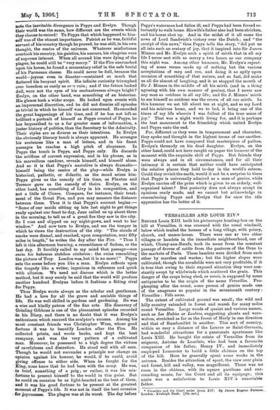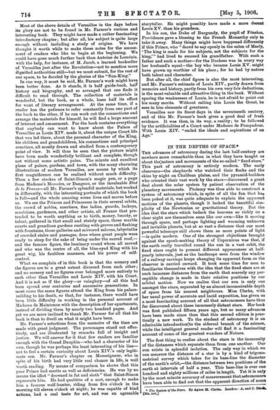VERSAILLES AND LOUIS XIV.*
BEFORE Louis XIII. built his picturesque hunting-box on the bill at Versailles, it was crowned with the usual windmill, below which trailed the houses of a long village, with priory, church, and manor-house. There were one Er two other villages or hamlets in the immediate neighbourhood, one of which, Choiay-aux-Bceufs, took its name from the constant passage of droves of cattle from the pastures of the Orne to the markets of Paris. These hamlets were divided from each other by marshes and wastes; but the higher slopes were cultivated, though the cornfields were not very profitable, if it is true that owing to their exposed situation they were con- stantly swept by whirlwinds which scattered the grain. This danger of the crops being shed, or verses, is supposed by some antiquaries to be the origin of the name Versailles. Pro- phesying after the event, some person of genius made one of the anagrams so popular in the seventeenth century : Versailles : Ville seras.
The extent of cultivated ground was small; the wild and hilly country extended in forest and marsh for many miles round Versailles. Large woods of quaint and various names, such as Les Hubies or Loubies, suggesting ghosts and were- wolves, stretched as far as the forest of Manly in one direction and that of Rambouillet in another. This sort of country, within so easy a distance of the Louvre or Saint-Germain, had wonderful attractions for a passionate sportsman like Louis XIII. He bought the estate of Versailles from its seigneur, Antoine de Lomenie, who had been a favourite companion of his father, Henry IV., and immediately employed Letnercier to build a little clelteau on the top of the hill. Here he generally spent some weeks in the autumn. Besides the attraction of sport, the view over plain and forest, hill and valley, was magnificent. There was no room in the chMeau, with its square pavilions and sur- rounding moats, for the Court and all its equipage ; this again was a satisfaction to Louis XIV.'s unsociable father.
* Versailles and the Court under Louis XIV. By James Eugene Farmer., London : Eveleigh Nash. [15s. net.]
Most of the above details of Versailles in the days before its glory are not to be found in Mr. Farmer's curious and interesting book. They might have made a rather fascinating introductory chapter; but after all, his subject is quite large enough without including a study of origins. We have thought it worth while to make these notes for the amuse- ment of readers who like to begin at the beginning. We could have gone much further back than Antoine de Lomenie, with the help, for instance, of M. Jacob, a learned bookseller of Versailles just after the Revolution—not to mention more dignified authorities still—but we must submit, for the rest of our space, to be dazzled by the glories of the "Sun-King."
In one way, it must be said, Mr. Farmer's work might have been better done. As it stands, it is half guide-book, half history and biography, and so arranged that one finds it
difficult to read through. The collection of materials is -wonderful, but the book, as a whole, loses half its effect
for want of literary arrangement. At the same time, if a reader has the patience to refer constantly from one part of the book to the other, if he can work out the connections and arrange the materials for himself, he will find a large amount of interest and amusement. For the book contains everything that anybody can want to know about the Palace of Versailles as Louis XIV. made it, about the unique Court life that was led there, about the personal character of the Xing, his children and grandchildren, his connections and principal courtiers, all mostly drawn and studied from a contemporary point of view. It will thus be seen that the picture might have been made wonderfully brilliant and complete, though not without some artistic pains. The minute and excellent plane of palace, gardens, and town, with the many charming illustrations of modern Versailles, are means by which its first magnificence can be realised without much difficulty.
Then a few strokes of Saint-Simon's magic pen, or a page from Madame's Memoirs, or Dangeau, or the invaluable Etat de la France—all Mr. Farmer's splendid materials, but worked in differently, with the interesting portraits of which the book is full—and the whole amazing scene lives and moves before us. We see the Princes and Princesses in their several orbits, the crowd of nobles, courtiers, fine ladies, guards, lackeys, musicians, gardeners, and other artists, all France that pre- tended to be worth anything as to birth, money, beauty, or talent, gathered in that small and stately space, those marble courts and grandiose gardens rustling with groves and flashing with fountains, those galleries and mirrored saloons, labyrinths of crowded stairs and passages, dens where great people were ready to sleep for the sake of being under the sacred roof,— and the famous figure, the luminary round whom all moved and who was the centre of all, the blue-eyed King with his great wig, his faultless manners, and his power of self- control.
What we complain of in this book is that the scenery and the figures are to a great extent divorced from each other ; and no scenery and no figures ever belonged more entirely to each other than Versailles and Louis XIV. with his Court. And it is not as if the glory—or vainglory—of all this had been spread over centuries and successive generations. In most cases the same figures attend the King from his palace- building to his death, so that, for instance, there would have been little difficulty in working in the personal account of Madame de Maintenon with the description of her apartments, instead of dividing them by nearly two hundred pages. And yet we are more inclined to thank Mr. Farmer for all that his book is than to dwell on what it might have been.
Mr. Farmer's selections from the memoirs of the time are made with great judgment. The personages stand out effec- tively, and are illustrated by remarks full of insight and justice. We will answer for it that few readers are familiar enough with the Grand Dauphin—who had a character of his own, though he was perhaps the least interesting of his line— not to feel a certain curiosity about Louis XIV.'s only legiti- mate son. Mr. Farmer's chapter on Monseigneur, who in spite ef hie birth had very little real Chalice in life, is well worth reading. ly means of comparison he shows that this poor Prince had merits as well as deficiencies. He was by no means the idiot "drowned in fat and sloth" that Saint-Simon represents him. He had qualities of a sort, enough to make him a famous wolf-hunter, riding from five o'clock in the morning till eleven o'clock at night; he was capable of kind actions, had a real taste for art, and was an agreeable
storyteller. He might possibly have made a more decent Louis XV. than his grandson.
In his son, the Duke of Burgundy, the pupil of Fenelon, Providence gave a blessing to the French Monarchy only to take it away Many things might have happened differently if this Prince, who "dared to say openly in the salon of Many,
The king is made for his subjects, not the subjects for the king," had lived to succeed his grandfather. With such a father and such a mother—for the Duchess was in every way her husband's equal—the boy who became Louis XV. might have grown up worthier of his place ; for he had by nature both talent and character.
But after all, the chief figure is also the most interesting, and Mr. Farmer's estimate of Louis XIV., partly drawn from memoirs and history, partly from his own very fair deductions, is the most valuable and attractive thing in the book. Without sparing the weaknesses of Louis, he is not afraid to point out his many merits. Without calling him Louis the Great, he sees in him elements of greatness.
Versailles saw its finest days in the seventeenth century, and of this Mr. Farmer's book gives a good deal of fresh evidence. It was then, in its way, a reality; to be followed by the artificialities of a Court under Madame de Pompadour. With Louis XIV. "ended the ideals and aspirations of an Age."









































 Previous page
Previous page